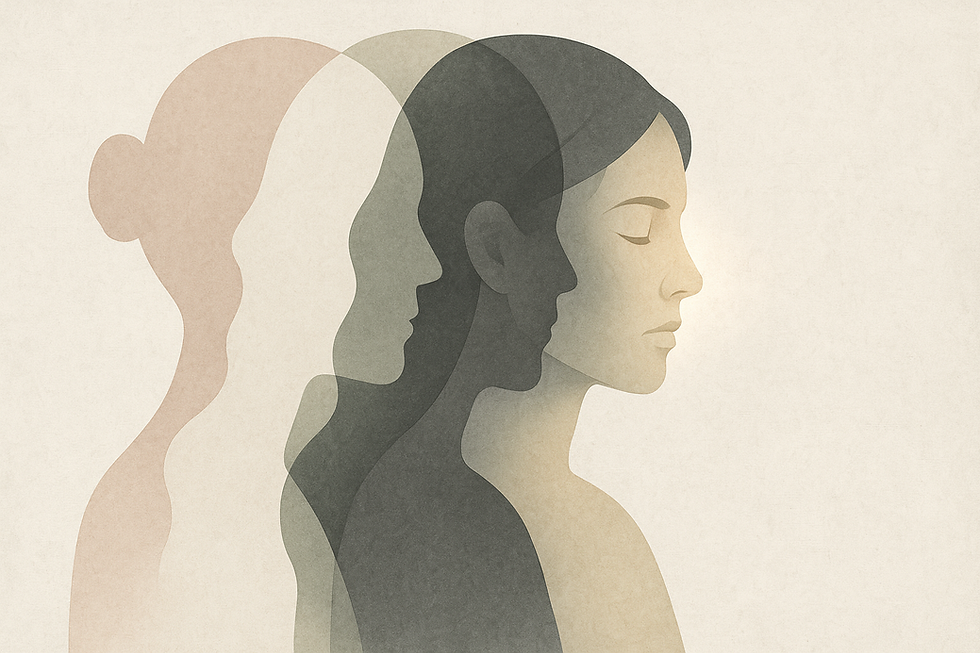Healing Is Not Linear
- Trina Kay

- Nov 2, 2025
- 4 min read
Healing doesn’t happen on a schedule.There isn’t a finish line or a single “aha” moment when the pain packs its bags and disappears. More often, it’s a series of quiet, ordinary days that slowly begin to look and feel like peace.
Some days you’ll feel strong, unstoppable even. You’ll wake up lighter, speak your truth with confidence, and believe—really believe—that the worst parts are behind you.And then, out of nowhere, a smell, a sound, or a tone of voice can pull you right back into the panic you thought you’d outgrown.
That’s the part nobody talks about enough.Healing isn’t linear. It’s a constant ebb and flow between what was, what is, and what’s still becoming.
The Leftovers of Survival
Even when you’re safe, your body doesn’t always know it. Trauma doesn’t vanish when you change your address or your relationship status—it lingers, quietly reshaping the way you move through the world.
You might find yourself apologizing for things that don’t need apologies.You might over-explain yourself to prove you’re not lying, even when no one accused you of it.You might feel a spike of anxiety if your partner starts cleaning while you’re resting—because in your old life, that sound often meant anger was coming.
These are what I call saved habits—behaviors that once kept you safe in survival mode but no longer serve you in healing. They’re proof of how smart and adaptive you were, even when you didn’t feel strong. But the same instincts that helped you survive can make you feel trapped later, when life is supposed to feel free.
The work of healing isn’t to shame yourself for those habits. It’s to notice them with compassion. To pause and remind yourself, I’m not in danger anymore.
When Intrusive Thoughts Sneak In
When Intrusive Thoughts Sneak In
Another part of healing that often catches survivors off guard is the return of intrusive thoughts—those unwanted, persistent, and distressing thoughts that seem to come out of nowhere and refuse to let go.
Everyone experiences intrusive thoughts from time to time, but for survivors, they tend to land harder. They can become overwhelming when they cause significant distress, interfere with daily life, or show up alongside other trauma responses. These thoughts are also common in mental health conditions like anxiety, OCD, and PTSD—but in the context of trauma, they often take on a more vivid form.
For many survivors, intrusive thoughts show up as flashbacks—sudden, sensory memories of abuse or violence that feel like they’re happening in real time. They can stop you dead in your tracks, like having the wind knocked out of you. One second you’re doing something ordinary—folding laundry, sitting in class, making dinner—and the next, your body and mind are pulled back into the past.
It’s disorienting. You can feel your heart race, your breathing change, your muscles tense. The world around you keeps moving, but inside, everything freezes. Nobody else can see the reel playing in your head, but it’s all you can see.
That’s what makes intrusive thoughts so frightening—they feel real. Your brain is reacting as though the danger is still present, even when you know you’re safe. It’s your nervous system’s way of trying to process what it couldn’t before.
The Myth of “All Better”
There’s this cultural expectation that one day you’ll be healed. Done. Fixed.But healing looks more like rebuilding a muscle after an injury—you get stronger, you learn your limits, you understand what triggers the pain. There might always be a tender spot, but tenderness isn’t weakness. It’s proof you lived through something that could have destroyed you and chose to keep going anyway.
Some survivors feel guilt when happiness returns. Others fear that joy is the calm before the next storm. That’s natural. Your body learned to brace for impact. Through therapy, awareness, and time, it learns that calm isn’t danger—it’s safety.
Permission to Be a Work in Progress
Healing asks for patience. It requires grace on the days you’re tired of being resilient. It’s okay to rest. It’s okay to not be productive. It’s okay to admit that even peace can feel foreign after chaos.
You don’t have to prove your healing to anyone.You are allowed to exist in the in-between—the space where you’re no longer who you were but not yet who you’re becoming.
If you catch yourself falling into old patterns—over-explaining, people-pleasing, saying sorry for taking up space—pause. Not to judge yourself, but to notice: This is what survival taught me. And I’m learning something new now.
Healing is a language you’ll keep translating as you go.Some days it sounds like laughter again. Some days it’s just breathing without bracing for impact.
Both count.
You are not behind.
You are not broken.
You are healing.
And that, all by itself, is enough.
If you need support, resources are always available through RAINN.org or the National Domestic Violence Hotline (1-800-799-SAFE).If you’d like to share your story or contribute to Survivor Voices, you can do so by emailing TrinaKayLLC@gmail.com






Comments